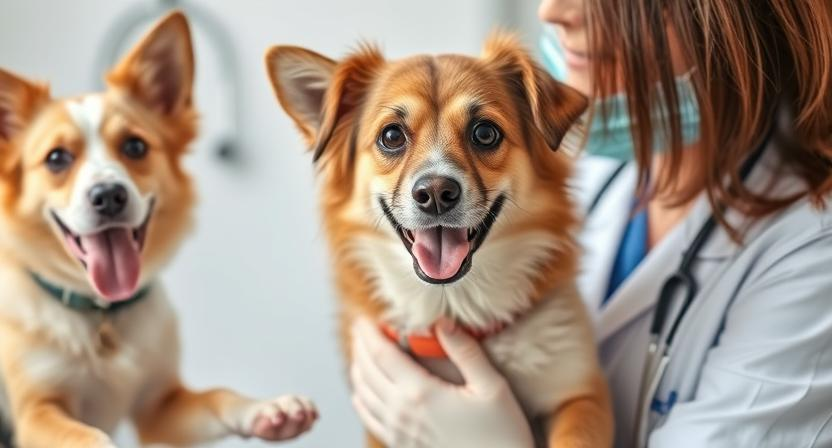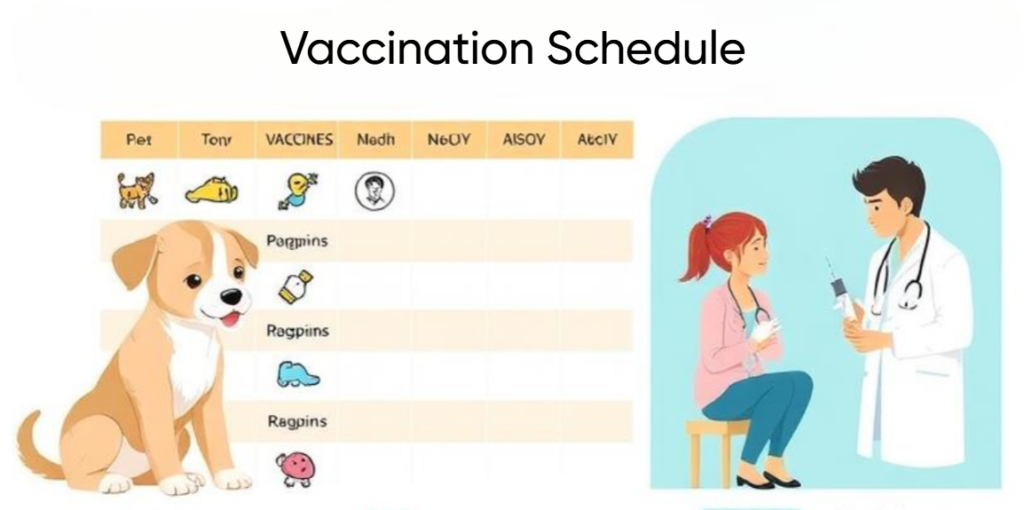
How Often Should I Take My Pet to the Veterinarian?
The Importance of Regular Veterinary Check-ups for Your Pet

Regular veterinary check-ups are crucial for the overall health and well-being of your beloved pet. These check-ups provide an opportunity for your veterinarian to assess your pet’s physical condition, monitor any ongoing medical conditions, and detect any potential health issues early on. During these check-ups, your vet will conduct a comprehensive examination of your pet, including a thorough assessment of their vital signs, body condition, eyes, ears, teeth, skin, and coat. They may also recommend additional tests, such as blood work or imaging, to further evaluate your pet’s internal health.
By scheduling regular vet check-ups, you are taking proactive measures to prevent and manage any health problems that might arise in your furry friend. During these visits, your vet can provide advice tailored to your pet’s specific needs, including dietary recommendations, exercise plans, and preventive care measures. Additionally, your vet will ensure that your pet is up to date on essential vaccinations, which are crucial in protecting them from contagious diseases. Regular vet check-ups not only help keep your pet healthy but also establish a strong foundation for a long and happy life together.
Understanding the Lifespan and Aging Process of Your Pet
Pets, like humans, go through an aging process that impacts their overall well-being and lifespan. Every pet has a different lifespan, depending on various factors such as breed, size, genetics, and overall health. Understanding the lifespan and aging process of your pet is essential for providing them with the appropriate care and ensuring a good quality of life.
As pets age, their bodies go through physical and physiological changes. They may become less active and energetic, experience joint stiffness, have a decrease in sensory abilities, and be more prone to certain health conditions. It is important for pet owners to be aware of these changes and adjust their care accordingly. Regular veterinary check-ups can help monitor your pet’s aging process, detect any potential health issues early on, and provide appropriate treatments to ensure their comfort and well-being. By understanding the lifespan and aging process of your pet, you can adapt their environment, diet, and exercise routine to meet their changing needs throughout the different stages of their life.
Factors to Consider When Determining Frequency of Vet Visits

When determining the frequency of vet visits for your pet, there are a few key factors to consider. Firstly, your pet’s age plays a significant role in determining how often they should visit the vet. Puppies and kittens require more frequent visits for vaccinations and general health check-ups, while adult pets may only need annual or biannual visits. Additionally, the specific needs and health conditions of your pet should be taken into account. Certain breeds or species may be more prone to certain illnesses or conditions, requiring more frequent monitoring and check-ups. Another factor to consider is your pet’s lifestyle and environment. Outdoor pets or those who participate in activities such as hunting or agility competitions may have a higher risk of injury or exposure to parasites, necessitating more frequent vet visits. Overall, it is important to work closely with your veterinarian to determine an appropriate schedule of vet visits based on your pet’s individual needs.
Signs and Symptoms That Indicate the Need for an Immediate Vet Visit
There are certain signs and symptoms that should never be ignored when it comes to your pet’s health. These indicators can indicate the need for an immediate vet visit and prompt medical attention. One such sign is difficulty breathing or shortness of breath. If your pet is struggling to breathe or is panting excessively, it could be a sign of an underlying respiratory issue or a bronchial problem that requires immediate attention from a veterinarian. Similarly, if your pet is experiencing severe pain, whether it is due to an injury or an unknown cause, it is crucial to seek veterinary care as soon as possible. Animals often hide their pain, so if you notice your pet exhibiting signs of distress, such as whimpering, growling, or reluctance to move, it should not be taken lightly.
Vaccination Schedule for Pets: What You Need to Know

The vaccination schedule for your pets is an important aspect of their overall healthcare. Vaccinations help protect against various diseases and prevent the spread of potentially harmful illnesses. It is crucial to stay informed about the recommended vaccines for your specific type of pet and ensure they receive these vaccinations at the appropriate times.
The specific vaccination schedule may vary depending on factors such as the age, breed, and lifestyle of your pet. The initial set of vaccinations typically begin when your pet is a few weeks old, and booster shots may be needed at different intervals thereafter. It is essential to follow the recommended vaccination schedule provided by your veterinarian to ensure your pet receives the necessary vaccinations to maintain their health and wellbeing. By staying up to date with their vaccinations, you can help protect your beloved pet from preventable diseases and keep them happy and healthy for years to come.
Preventive Care and Early Detection: How Regular Vet Visits Can Help
Preventive care and early detection play crucial roles in maintaining the health and well-being of our pets. Regular visits to the veterinarian can help in identifying potential health issues before they escalate into major problems. During these visits, veterinarians conduct comprehensive physical examinations, which allow them to assess your pet’s overall health, identify any underlying conditions, and provide necessary preventive care.
A key aspect of preventive care is vaccinations. Vaccines help protect pets from various contagious diseases that can be potentially dangerous or even fatal. Through regular vet visits, you can ensure that your pet receives the necessary vaccinations at the appropriate times to build their immunity. Additionally, routine check-ups provide an opportunity for veterinarians to discuss other preventive measures such as parasite control, heartworm prevention, and dental care, all of which contribute to the long-term health and well-being of your furry companion.
Dental Health for Pets: Why Regular Check-ups Are Essential

Regular check-ups for your pet’s dental health are essential for maintaining their overall well-being. Just like humans, pets can also suffer from dental problems such as tooth decay, gum disease, and bad breath. By scheduling regular check-ups with your veterinarian, you can ensure that any potential dental issues are detected and treated early on.
During a dental check-up, your veterinarian will examine your pet’s teeth and gums, looking for signs of infection, tartar buildup, or tooth decay. They may also perform a thorough teeth cleaning, removing any plaque or tartar that has accumulated. Regular check-ups can help prevent serious dental conditions, such as periodontal disease, which can lead to tooth loss and affect your pet’s ability to eat comfortably. By prioritizing dental health and scheduling regular check-ups, you can help your pet maintain a healthy mouth and a happy, pain-free life.
Parasite Prevention and Control: How Often to Consult the Vet
When it comes to parasite prevention and control for your pet, consulting with a veterinarian is essential. Regular check-ups with a vet can help determine the appropriate frequency for parasite prevention treatments based on factors such as your pet’s lifestyle, geographical location, and overall health. The expertise of a veterinarian will ensure that your pet receives the most effective and safe parasite control measures.
Parasites can pose a significant threat to your pet’s health and well-being. Fleas, ticks, heartworms, and intestinal worms are common parasites that can not only cause discomfort but also transmit diseases. By consulting with a vet, you can stay informed about the latest advancements in parasite prevention and control, ensuring that your furry friend receives the necessary protection. Your vet will be able to recommend the best products and treatments to keep your pet safe from parasites and maintain their optimal health.
Nutritional Needs of Your Pet: Why Regular Vet Consultations Matter

Your pet’s nutritional needs are vital for their overall health and well-being. As responsible pet owners, it is essential to understand that these needs may vary depending on their species, age, and any underlying health conditions they may have. This is where regular vet consultations come into play. Consulting with your veterinarian on a regular basis ensures that your pet’s nutritional requirements are being met adequately.
During these consultations, your vet will assess your pet’s current diet and recommend any necessary adjustments. They will consider factors such as the quality and quantity of food, the balance of essential nutrients, and any specific dietary restrictions or allergies your pet may have. Furthermore, regular vet consultations provide an opportunity to discuss any concerns or questions you may have regarding your pet’s nutrition. With their expertise, veterinarians can help tailor a dietary plan that suits your pet’s specific needs, promoting optimal health and longevity.
Creating a Pet Healthcare Plan: Tips for Scheduling Vet Visits
Regular veterinary check-ups are essential for maintaining the health and well-being of your pet. When creating a pet healthcare plan, it is important to consider the frequency of vet visits based on your pet’s specific needs. Factors such as age, breed, and overall health condition can determine how often your pet should see the veterinarian.
It is generally recommended to schedule annual check-ups for pets, even if they appear to be healthy. These visits allow the vet to assess your pet’s overall health, identify any potential issues, and provide preventive care such as vaccinations and parasite control. However, certain pets may require more frequent visits, particularly those with chronic health conditions or those in their senior years. Consulting with your veterinarian will help you determine the most suitable schedule for your pet’s healthcare needs.


